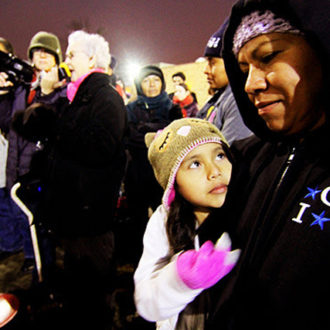
“Be angry about injustice! Use your skills to make the world a better place.” Dolores Huerta- Duke University, 1983
Women Farm Workers Face Special Challenges
- Women are 21 percent of all crop workers and 10 percent of the foreign-born newcomers. Women farmworkers are less likely than men to be unauthorized (39% vs. 56%) and are more likely than men to be U.S.-born (33% vs. 20%) National Agricultural Workers Survey, 2001-2002
- Farmworker women “do nearly every kind of farm labor on every kind of farm. They routinely earn less money than men for doing the same work.” Many face sexual harassment at work and are frequently isolated, living in remote rural areas, dependent upon their husbands or crew leaders for transportation. (Farmworker Justice Fund, Inc.)
- About 52 percent of farmworker women are U.S. born. Two out of three are non-Hispanic. Due to the need to migrate to find employment, two in five married farmworkers live apart from their spouses while doing farm work; the same proportion lives away from their children. http://www.medscape.com/viewarticle/470445
- Farmworker women and the wives of farmworkers enjoy few social and economic freedoms and face high unemployment. There is a lack of child care available, so they often bring their children to the fields with them. (Farmworker Justice Fund, Inc.)

- Prolonged standing and bending, overexertion, dehydration, poor nutrition, and pesticide and chemical exposures contribute to an increased risk of spontaneous abortion, premature delivery, and fetal abnormalities. Moreover, low socioeconomic status, frequently young maternal age, and inadequate prenatal care contribute to an infant mortality rate among MSFWs that is twice the national average. http://www.medscape.com/viewarticle/470445
- Certain pesticides have serious endocrine, reproductive, and oncogenic effects on pregnant women and on growing children. Breast and reproductive organ malignancies are associated with pesticide exposures. Pesticides, as endocrine disruptors, can cause abnormal genital development (and sexual precocity) and may be responsible, in part, for dramatically decreasing male sperm counts over the past 50 years. http://www.medscape.com/viewarticle/470445
- A 1995 survey of farmworker women conducted by the Migrant Clinicians Network, found that one in three had experienced domestic violence in the last year. The isolated nature of migrant labor camps, the transient life of migrant farmworkers, and the fact that farmworker housing is often tied to employment make it difficult for farmworker women who experience domestic violence to find help. For Latin American women who are migrating, family support networks are not as strong in the U.S. as in their native countries.
Furthur Reading:
The Green Motel – by Rebecca Clarren, Ms. Magazine, Summer 2005
That’s what some women farmworkers call the fields and orchards in which they face persistent sexual assaults.



